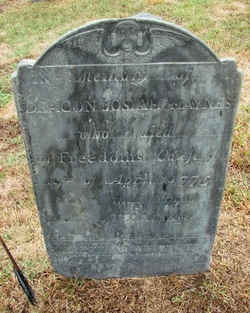Among those west Sudbury men was Josiah Haynes, a farmer born in 1696. He had served as a selectman and became a deacon in 1733. At age seventy-eight, Haynes no longer required to do militia duty—he was getting too old for that stuff. Nevertheless, on the morning of 19 April he turned out with his neighbors.
According to Lemuel Shattuck’s 1835 history of Concord, the two companies “received orders from a person stationed at the entrance of the town for the purpose of a guide, to proceed to the north instead of the south bridge.” That Concord man was later identified as Stephen Barrett (1750-1824), son of Col. James Barrett, commander of a Middlesex County militia regiment.
J. H. Temple’s 1887 History of Framingham said that the first order for Capt. Nixon’s Sudbury minutemen was to halt within sight of the South Bridge. At mid-morning British regulars showed up to hold that choke point as others searched designated properties in town.
Some Sudbury men wanted to attack those soldiers. Deacon Haynes reportedly told the captain, “If you don’t go and drive them British from that bridge, I shall call you a coward!” Nixon replied, “I should rather be called a coward by you, than called to account by my superior officer, for disobedience of orders.” Eventually orders arrived for the Sudbury men to march on the North Bridge by a roundabout route that took them past the Barrett farm.
Stephen Barrett’s father was on horseback with the Concord companies, which had withdrawn as the British column arrived and massed on the far side of the North Bridge on Punkatasset Hill. Barrett was also the principal custodian of the Massachusetts Provincial Congress’s artillery and other supplies in town. [See The Road to Concord for more details.]
Stephen’s mother, Rebeckah, was at the family home, watching British soldiers search the place for those weapons. Thanks to hard work by the Barretts and their neighbors in recent days, all of that ordnance had been hauled away and hidden. The regulars found only some carriage wheels, which they set about burning.
The Sudbury companies passed within sight of the Barrett farm while the British were at work. Lt. Col. How reportedly looked at the scene and said, “If any blood has been shed, not one of the rascals shall escape.” Shattuck wrote that he rode on alone to find out for sure, “disguising himself”—which might just have meant leaving his weapons behind so he looked like an ordinary farmer.
According to an 1875 account in Harper’s Magazine, How went all the way to Barrett’s farm and even talked with some of the British officers. Stephen Barrett also returned home around this time. Soldiers realized he was a Barrett and put him under arrest. Rebeckah Barrett intervened, pointing out that Stephen was her son, not her husband.
How rejoined the Sudbury men and they moved on, avoiding a clash with British troops for the second time that morning. But as they neared Punkatasset Hill, the provincials and the regulars started trading shots. The Sudbury companies hurried forward and joined in pushing the regulars away from the North Bridge before withdrawing again.
All the provincial companies that had arrived in Concord moved east, skirting the town center and taking positions to attack the British soldiers as soon as they left the populated area. That was the real start of the battle. The Sudbury militiamen joined in that fight, following the regulars east.
Somewhere in Lexington, old Deacon Haynes was shot and died. Here is his gravestone in Sudbury, courtesy of Find-a-Grave.
The inscription reads:
In Memory of
DEACON JOSIAH HAYNES
who died
in Freedoms Cause ye
19th of April, 1775.
In the 79th
Year of his Age.
Come listen all unto this call
Which God doth make today
For You must die as well as I
And pass from hence away

Hello!
ReplyDeleteMy husband is descended from Col. James Barrett, and, as a history teacher and amateur genealogist, I love your blog. However, I have a question about "Lydia" in this post. Wasn't James' mother Lydia and Stephen's mother Rebekah? Just trying to clarify, and I am happy to be wrong and learn more.
Thank you so much!
"Stephen’s mother, Lydia, was at the family home, watching British soldiers search the place for those weapons. Thanks to hard work by the Barretts and their neighbors in recent days, all of that ordnance had been hauled away and hidden. The regulars found only some carriage wheels, which they set about burning.
The Sudbury companies passed within sight of the Barrett farm while the British were at work. Lt. Col. How reportedly looked at the scene and said, “If any blood has been shed, not one of the rascals shall escape.” Shattuck wrote that he rode on alone to find out for sure, “disguising himself”—which might just have meant leaving his weapons behind so he looked like an ordinary farmer.
According to an 1875 account in Harper’s Magazine, How went all the way to Barrett’s farm and even talked with some of the British officers. Stephen Barrett also returned home around this time. Soldiers realized he was a Barrett and put him under arrest. Lydia Barrett intervened, pointing out that Stephen was her son, not her husband."
Signed, Big Barrett Fan
You’re right—James Barrett had a mother, a sister, and a daughter named Lydia, but his wife (and thus the mother of his son Stephen) was named Rebecca or Rebeckah. I’ll correct this posting.
ReplyDelete